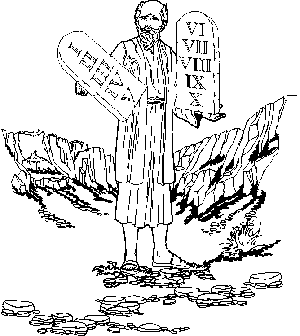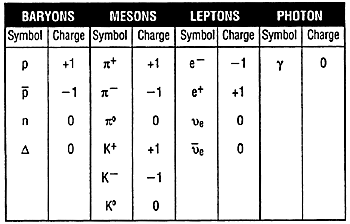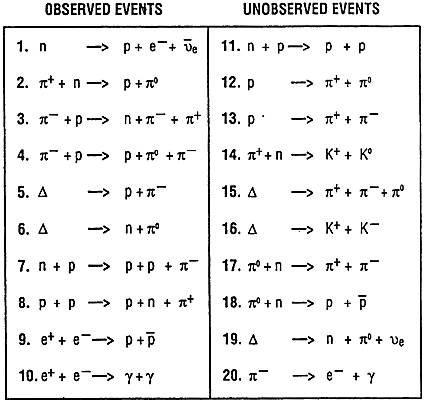 |
Discovering Some Conservation Laws |
 |
The following particle chart gives you all the information needed. Particles have many "charges" or characteristics; only the electric charges are listed below.

Often physics is presented as a set of rules written in stone. But how are the rules, such as the conservation laws, "discovered"? You will have the chance to discover some conservation laws that play a crucial role in particle physics. This may be the first time in your physics life that you will "discover" some conservation laws that you don't already "know."
Antiparticles are denoted by a bar over the name of the particle (e.g., p-bar = antiproton) or simply by the charges (e- = electron, e+ = positron = antielectron). An antiparticle has the same mass as its corresponding particle, but the opposite value for all charges.

The most common type of observation in particle physics is called an event. An event is similar to a chemical reaction in chemistry, in the sense that one set of particles is formed from another. The one below is the familiar beta decay.

Two lists of particle events are shown.
By examining the two sets, along with the preceding chart of particles, we must determine what quantities are or are not conserved in these particle physics events. These are the "rules of the game" played by nature.
- The list on the left consists of only events that are known to take place.
- The list on the right consists of only events that are believed not to take place. (They've never been observed)
- All of the conservation rules that can be deduced from the following events can be found by simple counting.
- All such quantities are conserved in every "observed" event, but at least one of these quantities is not conserved in each "unobserved" event.
- Assume that the incoming particles have sufficient energy to generate the outgoing particles so that energy is not a factor.
Share the work with different people checking different possibly-conserved quantities.

- List the conservation laws that you can deduce from these events.
- ___________________________________________
- ___________________________________________
- ___________________________________________
Hint: Consider any kind of "charge" for a particle to be +1, and for an antiparticle a -1.
- For each of the unobserved events, indicate what is NOT conserved. (There may be more than one answer)
Event #11: _______________ 16: _______________ 12: _______________ 17: _______________ 13: _______________ 18: _______________ 14: _______________ 19: _______________ 15: _______________ 20: _______________
Questions to ponder:
- What is meant when we say that a quantity is "conserved"?
- Which of the above events are decays?
- List all the conservation laws that you know. (You should have at least six, including the three you listed above.)
- Which of the conservation laws that you found is the generalization of what is known in chemistry as the conservation of mass?